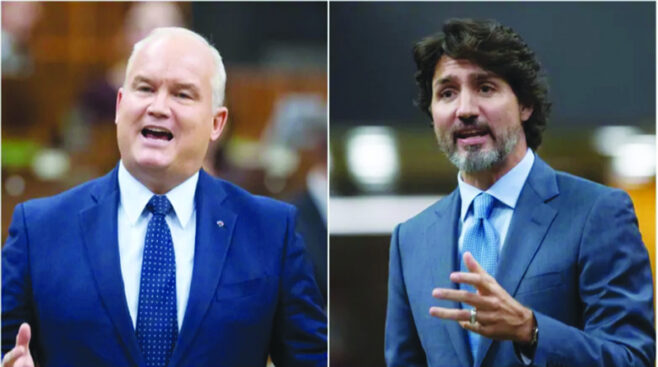Indications point to an upcoming federal election amid a second wave of COVID-19 infections in Canada.
The minority government of Liberal Prime Minister Justin Trudeau is preparing to present a national budget in the spring.
A potential vote of no confidence by opposition parties against the budget will trigger an election.
Meanwhile, Trudeau may want his own government to fail and force an election.
This is because Trudeua’s Liberals remain more popular than the main opposition, which is the Conservative Party of Canada.
A recent Mainstreet Research poll show that when asked which party Canadians would vote for if an election were held today, Trudeau’s Liberals were the choice of 39 per cent of leaning and decided voters.
The Mainstreet survey polled 3,132 adult Canadians on January 19 and January 20.
Support for Erin O’Toole and his Conservative party lags behind at 32 per cent.
New Democrats came in third with 14 per cent, followed by the Greens and the Bloc Québécois with five per cent each.
Support for the Liberals has remained steady, at 39 per cent, since the last Mainstreet poll in late November.
Conservative support increased by a slight 0.3 per cent after falling two per cent between October and November last year.
On January 25, Deputy Prime Minister and Finance Minister Chrystia Freeland, and Minister of Middle Class Prosperity and Associate Minister of Finance Mona Fortier launched pre-budget consultations.
These discussions allow the government to hear ideas from Canadians and experts for Budget 2021.
According to a government news release, When COVID-19 is under control and Canada’s economy is ready to rebound, the government has a plan to make smart, targeted investments to jumpstart the country’s economic recovery and begin to repair the damage done by the pandemic.
The government will hold virtual roundtables with diverse groups of people from a range of regions, sectors and industries, including those hardest hit by the pandemic.
Canadians are invited to share their ideas through an online questionnaire at LetsTalkBudget2021.ca, which will be available until February 19, 2021.
On January 12, Trudeau shuffled his cabinet after longtime Liberal Navdeep Bains stepped down as a minister.
Bains stays as the MP for Mississauga-Malton, Ontario until the next election. He will not run again.
The timing of Bains’ departure sparked questions about whether the next federal vote could be looming.
Trudeau asserted that the shuffle isn’t meant to be seen as pre-election positioning.
However, Trudeau did not rule out a snap federal campaign before all Canadians are vaccinated against COVID-19.
With a minority government, the next election could be called ahead of the next scheduled election date of October 16, 2023.
Few minority governments in Canada last a full term.
Trudeau reiterated that the Liberals do not want an election right now, and his “preference” would be that a federal race would be put off at least until mass vaccinations are complete.
However, the prime minister did not make an outright commitment to not trigger an election, saying that in a minority it could be up to the opposition parties.
Trudeau, who lost his majority in parliament in the 2019 election, has repeatedly told Canadians in recent months that a fresh ballot could be just around the corner.
But he insisted that managing the pandemic was his government’s top priority.
“From the very beginning of any minority parliament, every political party understands that elections can happen,” Trudeau said. “But as I’ve been consistently saying, we don’t want an election.”
Trudeau’s last cabinet shuffle was in August 2020.
The shuffle followed finance minister Bill Morneau’s surprise resignation in the wake of ethics violations related to his ties to a charity that was tasked with doling out pandemic aid on behalf of the government.
The contract was cancelled after it was discovered that Morneau’s daughter worked for the WE Charity.








